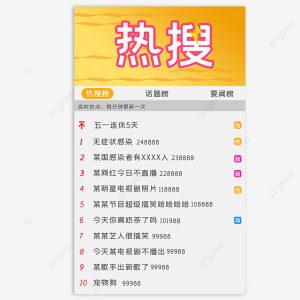20 Hot Search – 熱搜 (Rè sōu)
Trisha Nguyen
simplified Chinese: 熱搜; pinyin: Rè sōu
Hotpot

Hot search (Chinese: 热搜, pinyin: rèsōu) is a concept that Chinese social network Weibo users are familiar with. After Tencent’s WeChat, Weibo is China’s largest social media platform, with over 300 million monthly active users. In comparison to WeChat, Sina’s Weibo is primarily used by the younger generation and offers more information as well as trending content. Similarly, Weibo enables businesses to create official and verified accounts in order to communicate with followers and advertise their products and services. Because of these factors, Weibo’s hot search list has become a one of the tools used to assess the popularity and interest of netizens in a particular character or social issue. Usually, Sina’s Weibo Hot Search List (HSL) displays the popularity ranking of the top 50 hashtags in real-time, based on an algorithm in which the number of hashtag searches is dominant. The more people who search, care about, and debate that topic, the more likely it is that that keyword will appear near the top of the “hot search” search results.
Hashtags, Frequent and Timely Content, Super Topics, User-Generated Content, and other factors all influence the likelihood that a topic or person will appear on the hot search list. In addition, there is a color system that ranks how popular the topics are in real time (“Top 10 Tips for Weibo Marketing – Dragon Trail International”). 暴洪(sudden flood, pinyin: Bàohóng) is a common term in this color system. Because the word has a sudden and powerful meaning, it is used to refer to shocking events on set. In addition, “Bàohóng” has another meaning, which is “red burst” or “suddenly brilliant” due to the pronunciation. The word “violent” means “outbreak,” while “pink” can be interpreted as “red.” The term is commonly used among young Chinese to describe someone’s sudden and unexpected popularity.
Young people, especially at night, have many opportunities to focus on enjoying entertainment activities such as movies and social events, which brings the topic to the Hot search list. The popularity of the terms in Weibo’s hot search list is determined by the search, use of hashtags, and other factors, and is represented by different shades of red. Yellow and orange indicate that the term is well-known but not widely searched for, whereas pink, red, and maroon indicate that the term is a well-known topic that many people look up for. However, HSL can be manipulated by bots to create “fake popularity” for the topics for either bad or good reasons. Weibo users may be misled in spreading hype, large-scale pictures and videos with erroneous data, a large number of unhealthy information such as inducing minors to participate in rankings, and illegal user information collection.
Citations:
Dragon Trail International.” Top 10 Tips for Weibo Marketing – Dragon Trail International, dragontrail.com/resources/blog/weibo-travel-marketing#:~:text=Check%20the%20%E2%80%9CHot%20Topics%E2%80%9D%20section,you%20use%20the%20associated%20hashtag.&text=There’s%20a%20special%20kind%20of,topic’%20(%E8%B6%85%E8%AF%9D).
